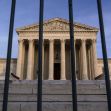On November 9, 2020, the Trump Campaign, represented by Linda Kerns and two attorneys from Porter, Wright, Morris & Arthur brought suit against Pennsylvania’s Secretary of State, Kathy Boockvar, in the United States District Court for the Middle District of Pennsylvania. The action was part of the Campaign’s fusillade of lawsuits intended ultimately to overturn the results of the November 3rd election. In the case under discussion, the defendant was represented by the Pennsylvania Attorney General along with attorneys from the elite Washington firm of Kirkland & Ellis.
On November 12, the two attorneys for Porter Wright, responding to what court documents described as “threats and outside pressures” from the alliance of anti-Trump Republicans known as the Lincoln Project, removed themselves from the case. That left Kerns briefly in sole charge until two Texas attorneys were brought in to replace the Porter Wright lawyers.
On the morning of November 14, Kerns received an abusive voicemail that “by any measure falls afoul of standards of professional conduct” from someone at Kirkland & Ellis. The details of the voicemail were not made public, but the call was sufficiently disturbing to bring Kerns to file a motion for Kirkland & Ellis to show cause.
Kirkland & Ellis’ response was denial. When confronted with incontrovertible caller ID evidence that the call had originated from a firm cell phone, the firm revealed that the voicemail had been left by an associate not working on the case and acting on his own initiative. They admitted that the call was “discourteous” and apologized “for wasting time.”
Kerns was not satisfied with the incomplete apology and brought the aforementioned motion before the court. The voicemail came on top of “continuous harassment…and even accusations of treason” to which Kerns had been subjected by the public since she had taken on the case. The call was also was very likely a factor in the request of the two Texas attorneys to withdraw from appearance the next day, the 16th, a scant 72 hours after they had taken on the case. Kearns also requested to withdraw at that time. While Judge Matthew Brann granted the other attorneys’ request, he denied Kerns’, on the grounds that oral arguments had been set for the very next day.
Kerns was subsequently joined in representing the plaintiffs by, on November 16, Marc Scaringi, and on the 17th, by no less a figure than Rudolph Giuliani. On the 20th, the newcomers filed a motion for leave to amend their already amended complaint. That motion mentions that “Ms. Kerns herself has been the subject of threats of harm, to the point at which the involvement of police and U.S. Marshals has been necessary to provide for her safety.” That came a day after Judge Brann finally allowed Kerns to withdraw.
That wasn’t the end of the story, however. Kerns’ removal from the case was succeeded by a motion filed with the court (also on the 20th) by Kirkland & Ellis, requesting its own withdrawal from appearance.
While the many defections of counsel in the course of the proceedings can be viewed as a case of rats deserting a sinking ship, the entire brouhaha proved pointless when, on the 21st, Judge Brann accepted the defendant’s petition for dismissal of the case. Judge Brann’s memorandum opinion states that: this Court has been presented with strained legal arguments without merit and speculative accusations, unpled in the operative complaint and unsupported by evidence. In the United States of America, this cannot justify the disenfranchisement of a single voter, let alone all the voters of its sixth most populated state.
The case was dismissed with prejudice, with leave to amend denied. Given the tone of Judge Brann’s opinion, one can only wonder at all the drama regarding counsel and the abuse heaped upon the various attorneys appearing for the plaintiff. The irony is that, if everyone had just sat tight for a few days, the entire matter would have resolved itself.
The story of Linda Kerns is indicative of the tensions surrounding the President’s attempts at changing the outcome of the election. Threats and abuse beset the attorneys bringing the President’s lawsuit, beginning with the Lincoln Project and running through the associate at Kirkland & Ellis. This was despite the fact that one can question whether any of the various attorneys for the plaintiff ever believed in the sloppily conceived and oft-amended case they were attempting to bring.
Specious though the merits of the case may have been, everyone is nonetheless entitled to his day in court, even the President, and even if only to have his complaint dismissed summarily. Not understanding that – as the harassment of the plaintiff’s attorneys shows – is missing the point of the system the harassers claim they seek to protect.






